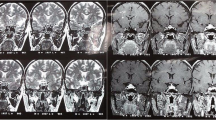Abstract
A 15-year-o1d girl was admitted to the New England Medical Center Hospital (NEMCH) for investigation of the hypothalamic-pituitary axis. Four years earlier, an eosinophilic granuloma was discovered in the left mandible and was treated with excision and irradiation (1000 rads). Two years earlier she developed polyuria, and a diagnosis of diabetes insipidus was made at another hospital. She was treated with synthetic lysine vasopressin nasal spray (Diapid) several times a day and noted some symptomatic improvement. Eighteen months before admission, her menstrual periods, which had been normal for the previous 14 months, ceased and she complained of cold intolerance, constipation, and weight gain. She claimed to have grown 0.5 in. over the year prior to admission. She had occasional mild headaches when she did not take her medication but noted no visual disturbances. Family history was unrevealing. Her mother was 61 in. tall.
Access this chapter
Tax calculation will be finalised at checkout
Purchases are for personal use only
Preview
Unable to display preview. Download preview PDF.
Similar content being viewed by others
References
Verney EG: The absorption and excretion of water: the antiuretic hormone. Lancet 2:739-744, 781–783, 1946
Andersson B: Polydipsia, antidiuresis and milk ejection caused by hypothalamic stimulation, In Heller H (ed.): The Neurohypophysis, London, Butterworth, 1957
Barlow ED, de Wardener HE: Compulsive water drinking. QJ Med 28: 235, 1959
Price JOE, Lauener RW: Serum and urine osmolalities in the differential diagnosis of polyuric states. JClin Endocrinol Metab 26: 143–148, 1966
Randall RV, Clark EC, Bahn RC: Classification of the causes of diabetes insipidus. Proc Mayo Clin 34: 299, 1959
Blotner H: Primary or idiopathic diabetes insipidus: a system disease. Metabolism 7: 191, 1958
Blotner H: The inheritance of diabetes insipidus. Am J Med Sci 204: 261, 1942
Fischer C, Ingram WR, Ranson SW: Diabetes Insipidus and the Neurohormonal Control of Water Balance. Ann Arbor, Edwards Brothers, 1938
Zaoral M. Kole J, Sorm F: Amino acids and peptides. LXXI. Synthesis of 1-deamino-8-D-aminobutyrine vasopressin, 1-deamino-8-D-Iysine vasopressin and 1-deamino-8-D-arginine vasopressin. ColI Czech Chern Commun 32: 1250–1257, 1967
Sawyer WH, Acosta M, Balaspiri L, Judd J, Manning M: Structural changes in the arginine vasopressin molecule that enhance antidiuretic and specificity. Endocrinology 94: 1106–1115, 1974
Sawyer WH, Acosta M, Manning M: Structural changes in arginine vasopressin molecule that prolong its antidiuretic action. Endocrinology 95: 140–149, 1974
Reichlin S: Regulation of the endocrine hypothalamus. Med Clin North Am 62: 235–250, 1978
Hayward IN: Functional and morphological aspects of hypothalamic neurons. Physiol Rev 57: 574–658, 1977
Walker LA, Whorton AR, Smigel M, France R, Frolich JC: Antidiuretic hormone increases renal prostaglandin synthesis in vivo. Am J Physiol 235:F180–F185, 1978 or Am J Physiol (Renal Fluid Electrolyte Physiol.) 4: F180–F185, 1978
Anderson RJ, Berl T, McDonald KM, Schrier RW: Evidence for an in vivo antagonism between vasopressin and prostaglandin in the mammalian kidney. J Clin Invest 56: 420–426, 1975
Urakabe S, Takamitsu Y, Shirai D, Yuasa S, Kimura G, Orita Y, Abe H: Effect of different prostaglandins on the permeability of the toad urinary bladder. Comp Biochem Physiol 52: 1–4, 1975
Zusman RM, Keiser HR, Handler JS: Vasopressin-stimulated prostaglandin E biosynthesis in the toad urinary baldder: effect on water flow. J Clin Invest 60: 1339–1347, 1977
Lozada ES, Gouanx J, Franki N, Appel GB, Hays RM: Studies on the mode of action of sulfonylureas and phenylacetamides in enhancing the effect of vasopressin. J Clin Endocrinol Metab 34: 704–712, 1972
Moses AM, Numann P, Miller M: Mechanism of chlorpropamide induced antidiuresis in man: evidence for release of ADH and enhancement of peripheral action. Metabolism 22: 59–66, 1973
Cobb WE, Spare S, Reichlin S: Neurogenic diabetes insipidus: management with dDAVP (1-desamino-8-D arginine vasopressin) Ann Intern Med 88: 183–188, 1978
Editor information
Editors and Affiliations
Rights and permissions
Copyright information
© 1983 International Society of Nephrology
About this paper
Cite this paper
Leaf, A. (1983). Neurogenic Diabetes Insipidus. In: Cohen, J.J., Harrington, J.T., Kassirer, J.P. (eds) Nephrology Forum. Springer, New York, NY. https://doi.org/10.1007/978-1-4612-5465-2_9
Download citation
DOI: https://doi.org/10.1007/978-1-4612-5465-2_9
Publisher Name: Springer, New York, NY
Print ISBN: 978-0-387-90764-2
Online ISBN: 978-1-4612-5465-2
eBook Packages: Springer Book Archive



